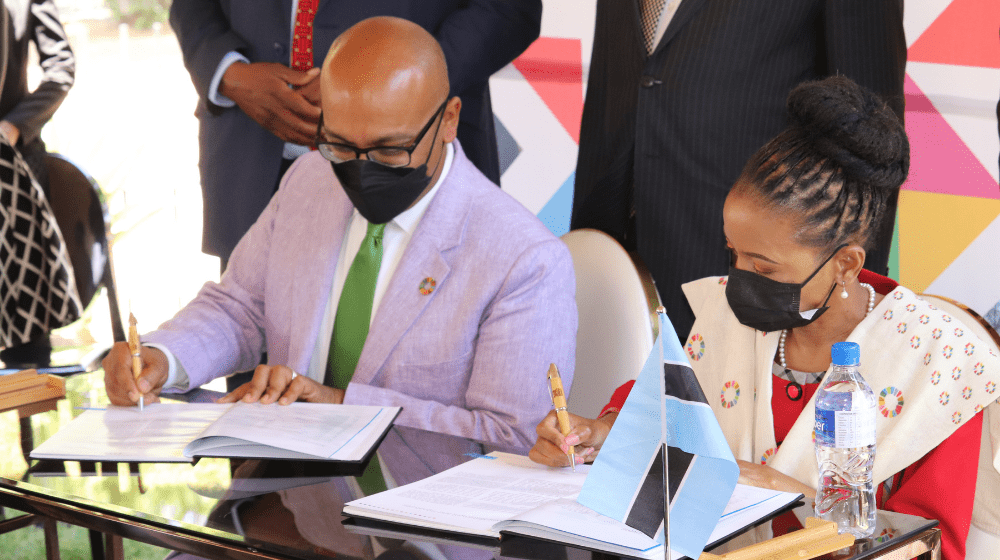GABORONE, Botswana- To mark the United Nations (UN) 76th anniversary, the Government of Botswana and United Nations in Botswana on Thursday 4 November signed the United Nations Sustainable Development Cooperation Framework (UNSDCF) 2022-2026. This framework is the blueprint for the UN Development System’s support to Botswana to address national priorities and challenges in achieving the 2030 Agenda for sustainable development.
The Cooperation Framework was signed by the Minister of Finance and Economic Development, Honorable Peggy Serame, on behalf of the Government of Botswana, and His Excellency Zia Choudhury, UN Resident Coordinator on behalf of the United Nations.
In his remarks, the United Nations Resident Coordinator His Excellency Zia Choudhury said the Cooperation Framework is important because it is an overarching agreement of what the UN family will do in the next 5 years. He noted that these are a critical 5 years, as they are the first half of the decade of action that aspires to reach the SDGs by 2030.
Mr. Choudhury further highlighted that the Cooperation Framework was developed with inputs from every corner of Botswana, in the true spirit of the UN, as an agency of the people and for the people. “With human rights as our foundation we have developed an ambitious and caring map for what we will do together, with our diverse partners, to support all people in Botswana to live a peaceful, dignified and prosperous life. A life where we respect our land and resources, acknowledging that ahead of us are many, many generations of our descendants, who must live harmoniously with nature and with each other,” he said.
The UN Country Team and partners from Government, civil society and the private sector participated in a series of consultative strategic foresight workshops as part of the process of identifying Botswana’s most critical priorities for accelerating progress on the 2030 Agenda. The consultation process prioritised the four development challenges to be addressed in the Cooperation Framework: People, Planet, Prosperity and Peace and Partnerships.
Under these Strategic Priorities, five Outcome Results were also formulated, for which the United Nations Development System will focus its support on for the period 2022 – 2026.
For her part, the Minister of Finance and Economic Development Honorable Peggy Serame reaffirmed the Government of Botswana’s commitment to the framework and called upon all stakeholders, to embrace it and work together towards its successful implementation.
“The Governance structures as well as the Monitoring and Evaluation aspects of the framework have been strengthened and roles of all stakeholders clarified, I assure you of the commitment and full support in ensuring the achievement of the objectives of this Cooperation Framework,” she said.
She implored the civil society, women and youth organizations to take their rightful place and be ready to engage with the Framework when the time for implementation comes.
For his remarks, the Minister of International Affairs and International Affairs Honorable Lemogang Kwape expressed that he had no doubt that the Framework will help ensure that Botswana’s recovery from COVID-19 leaves no one behind as well as infuse momentum in efforts to realise the 2030 Agenda and its Global Goals in this Decade of Action.
“The signing of this cooperation framework is another welcome demonstration of the mutually beneficial relationship between the UN system in Botswana and the Government and people of Botswana,” he said.
The United Nations Sustainable Development Cooperation Framework (UNSDCF) is a core instrument for providing a coherent, strategic direction for UN development activities by all UN entities at country level. It guides the UN system in planning and implementing UN development activities at country level, as well as in mobilising a spectrum of development partners beyond the United Nations.
UNFPA like the rest of the UN family is fully aligned to the UNSDCF. Its next country programme will commence in 2022 and end in 2026. Its vision its is to achieve universal access to Sexual Reproductive Health and Rights with emphasis on left behind groups.
The programme will contribute to three of the 5 outcome areas of the UN Country Programme. It is aligned to all three UNFPA transformative results, (ending preventable maternal deaths, ending unmet need for family planning and ending gender based violence and all harmful practices) including the ESAR one on ending the sexual transmission of HIV.
The UN Country Team continues working closely with the government to address the socioeconomic fallout of the pandemic and recovery needs.
*END*


